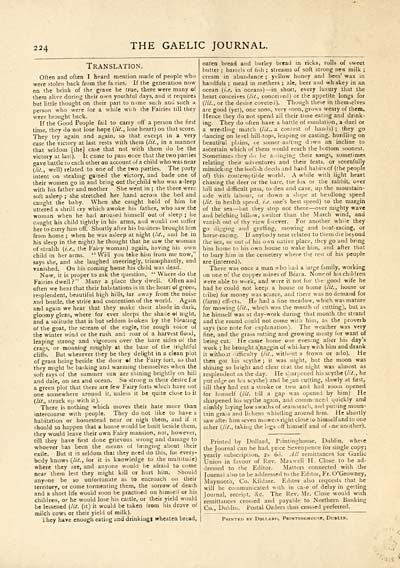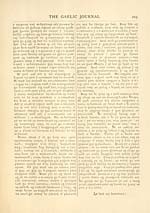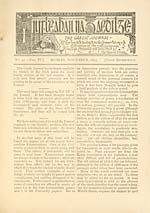Download files
Complete book:
Individual page:
Thumbnail gallery: Grid view | List view

224
THE GAELIC JOURNAL.
Translation.
Often and often I heard mention made of people who
were stolen back from the fairies. If the generation now
on the brink of the grave be true, there were many of
them alive during their own youthful days, and it requires
but little thought on their part to n.ime such and such a
person who were for a while wiih the Fairies till they
were brought back.
If the Good People fail to carry off a person the first
time, they do not lose hope (lit., lose heart) on that score.
They try again and again, so that except in a very
case the victory at last rests with them {///., in a manner
that seldom [the] case that not with them do be the
victory at last). It came to pass once th.it the two parties
gave battle to each other on account uf a child who was near
(/;■/., well) related to one of the two parties. The party
intent on stealing gained the victory, and bade one of
their women go in and bring out the_child who was asleep
with his father and mother She went in ; the three were
soft asleep ; she stretched her hand across the bed and
caught the baby. When she caught hold of him he
uttered a shrill cry which awoke his father, who saw the
woman when he had aroused himself out of sleep ; he
caught his child tightly in his arms, and would not siilifcr
her to carry him off. Shortly after his business brought him
from home ; when he was asleep at night (lit., and he in
his sleep in the night) he thought that he saw the woman
of stealth (i.e., the Fairy woman) again, having his own
child in her arms. " Will you take him from me now,"
says she, and she laughed sneeringly, triumphantly, and
vanished. On his coming heme his child was dead.
Now, it is proper to ask the question. " Wliere do the
Fairies dwell ? " Many a place they dwell. Often and
often we hear that their habitations is in the heart of green,
resplendent, beautiful high hills, far away from the noise
and bustle, the strile and contention of the world. Again
and again we hear that they make their abode in dark,
gloomy glens, where for ever sleeps the shade ol night,
and a solitude that is but seldom bioken by the bleating
ot the goat, the scream of the e.agle, the rough voice of
the winter wind or the rush and roar of a harvest flood,
leaping strong and vigorous over the bare sides ol the
crags, or moaning roughly at the base of the i rightful
cliffs. But wherever tliey be they delight in a clean plot
of grass being beside the dour «f the Fairy fort, so that
they might be basking and warming themselves when the
soft rays of the summer sun are shining brightly on hill
and dale, on sea and ocean. So strong is their desire fjr
a green plot that there are few Fairy forts which have not
one somewhere around it, unless it be quite close to it
[lit., struck up with it).
There is nothing which moves their hate more than
intercourse with people. They do not like to have a
habitation or homestead ne.ir or nigh them, and if it
should so happen that a house would be built beside them,
they would leave their own Fairy mansion, not, however,
till they have first done grievous wrong and damage to
whoever has been the means of bringing about their
exile. But it is seldom that they need do this, for every-
bcdy knows (/;>., for it is knowledge to the multitude)
where they are, and anyone would be afraid to come
near them lest they might kill or hurt him. Should
anyone be so unfortunate as to encroach on their
territory, or come tormenting them, the sorrow of deaih
and a short life would soon be practised on himself or his
children, or he would lose his cattle, or their yield would
be lessened (lit. (it) it would be taken from his drove of
milch cows or their yield of milk).
They have enough eating and drinking! wheaten bread,
oaten bread and barley bread in ricks, rolls of sweet
butter ; barrels of fish ; streams of soft strong new milk ;
cream in abundance ; yellow honey and bees' wax in
handfuls ; mead in methers ; ale, beer and wh.skey in an
ocean (i.e. in oceans) — in short, every luxury that the
heart conceives (/(/., conceiveii) or the appetite longs for
{lit., or the desire coveted). Though these in themselves
are good (yet), one soon, very soon, grows weary of them.
Hence they do not spend all their time eating and drink-
ing. They do often have a battle of emulation, a duel or
a wrestling match (/(/., a contest of hands) ; they go
dancing on level hill-tops, leaping or casting, hurdling on
beautilul pl.dns, or somer-aultnig d^wii an incline to
ascertain which of them would reach the bottom soonest.
Sometimes they do be a-.-inyiuL,' their songs, sometimes
relating their adventures and their feats, or scornfully
mimicking the foolish deeds and hard habits of (the people
oO tills contemptible world. A while with light heart
chasing the deer or the hare, the fox or the rabbit, oyer
hill and difficult pass, to den and cave, up the mountain-
side with labour, or down a slope at heidlong speed
(lit. in health speed, i.e. one's best speed) to the margin
of the sea — but they stop not there— over mighty wave
and belching billow, swifter than the March wind, and
vanish out uf thy view forever. For another while they
go digging and graffing, mowing and boat-racing, or
horse-racing. If anybody near related to them die be)ond
the sea, or out of his own native place, they go and bring
him home to liis own house to wake him, and after that
to bury him in the cemetery where the rest of his people
are (interred).
There was once a man «ho had a large f.imily, working
on one of the copper ndnes of Beaia. None of his children
were able to work, and were it not fur the good wife he
had he could not keep a house or home (lit,, house or
tribe) for money was scarce, and there was no demand for
(farm) effects. He had a fine meadow, which was mature
for mowing (lit., which w.ts the month of cutting), but as
he himself was at day-work during that month the strand
and the round could not come with him, as the proverb
s.ays (see note for explanation). The weather was very
fine, and the grass rotting and growing musty for want of
being cut. He came home one evening after his day's
work ; he brought a|naggin of whi-key with him and drank
it witho.it 'iifficulty'(/i7., without a frown or ado). He
then got his scythe ; it was night, but the moon was
shiiung so bright and clear tliat the night was almost as
resplendent as the day. He sjarpeiied his scythe (lit., he
put edge on his scythe) and be^an cutting, slowly at first,
till they had cut a stroke or two and had room opened
for himself (///. till a gap was opened by him) lie
sharpened his scythe again, and comiriLnced quickly and
nimbly l.rying low swaths of .seamirach, and putting moun-
tain grass and lichens whistling around hmi. He shortly
sawaftei him seven niuweis right close lo himself and to one
other (lit., taking the legs off himself and of one another).
Printed by Dollard, Printinghouse, Dublin, wheie
the Journal can be had. price Sevenpence for single copy;
yearly subscription, 2s. 6d. All remittances for Gaelic
Union in favour of Rev. Maxwell H. Close, to be ad-
ilressed to the Editor. Matters connected with the
Journal also to be addressed to the Editor, Fr. O'Growney,
Maynooth, Co. Kildare. Editor also requests that he
will be communicated with in ca-e of delay in getting
lournal, recei|it, &c. The Rev. Mr. Close would wish
remittances crossed and payalile to Northern Banking
Co., Dublin. Postal Orders thus crossed preferred.
Phinteu bv Dollarp. Printinghousk, Dublin.
THE GAELIC JOURNAL.
Translation.
Often and often I heard mention made of people who
were stolen back from the fairies. If the generation now
on the brink of the grave be true, there were many of
them alive during their own youthful days, and it requires
but little thought on their part to n.ime such and such a
person who were for a while wiih the Fairies till they
were brought back.
If the Good People fail to carry off a person the first
time, they do not lose hope (lit., lose heart) on that score.
They try again and again, so that except in a very
case the victory at last rests with them {///., in a manner
that seldom [the] case that not with them do be the
victory at last). It came to pass once th.it the two parties
gave battle to each other on account uf a child who was near
(/;■/., well) related to one of the two parties. The party
intent on stealing gained the victory, and bade one of
their women go in and bring out the_child who was asleep
with his father and mother She went in ; the three were
soft asleep ; she stretched her hand across the bed and
caught the baby. When she caught hold of him he
uttered a shrill cry which awoke his father, who saw the
woman when he had aroused himself out of sleep ; he
caught his child tightly in his arms, and would not siilifcr
her to carry him off. Shortly after his business brought him
from home ; when he was asleep at night (lit., and he in
his sleep in the night) he thought that he saw the woman
of stealth (i.e., the Fairy woman) again, having his own
child in her arms. " Will you take him from me now,"
says she, and she laughed sneeringly, triumphantly, and
vanished. On his coming heme his child was dead.
Now, it is proper to ask the question. " Wliere do the
Fairies dwell ? " Many a place they dwell. Often and
often we hear that their habitations is in the heart of green,
resplendent, beautiful high hills, far away from the noise
and bustle, the strile and contention of the world. Again
and again we hear that they make their abode in dark,
gloomy glens, where for ever sleeps the shade ol night,
and a solitude that is but seldom bioken by the bleating
ot the goat, the scream of the e.agle, the rough voice of
the winter wind or the rush and roar of a harvest flood,
leaping strong and vigorous over the bare sides ol the
crags, or moaning roughly at the base of the i rightful
cliffs. But wherever tliey be they delight in a clean plot
of grass being beside the dour «f the Fairy fort, so that
they might be basking and warming themselves when the
soft rays of the summer sun are shining brightly on hill
and dale, on sea and ocean. So strong is their desire fjr
a green plot that there are few Fairy forts which have not
one somewhere around it, unless it be quite close to it
[lit., struck up with it).
There is nothing which moves their hate more than
intercourse with people. They do not like to have a
habitation or homestead ne.ir or nigh them, and if it
should so happen that a house would be built beside them,
they would leave their own Fairy mansion, not, however,
till they have first done grievous wrong and damage to
whoever has been the means of bringing about their
exile. But it is seldom that they need do this, for every-
bcdy knows (/;>., for it is knowledge to the multitude)
where they are, and anyone would be afraid to come
near them lest they might kill or hurt him. Should
anyone be so unfortunate as to encroach on their
territory, or come tormenting them, the sorrow of deaih
and a short life would soon be practised on himself or his
children, or he would lose his cattle, or their yield would
be lessened (lit. (it) it would be taken from his drove of
milch cows or their yield of milk).
They have enough eating and drinking! wheaten bread,
oaten bread and barley bread in ricks, rolls of sweet
butter ; barrels of fish ; streams of soft strong new milk ;
cream in abundance ; yellow honey and bees' wax in
handfuls ; mead in methers ; ale, beer and wh.skey in an
ocean (i.e. in oceans) — in short, every luxury that the
heart conceives (/(/., conceiveii) or the appetite longs for
{lit., or the desire coveted). Though these in themselves
are good (yet), one soon, very soon, grows weary of them.
Hence they do not spend all their time eating and drink-
ing. They do often have a battle of emulation, a duel or
a wrestling match (/(/., a contest of hands) ; they go
dancing on level hill-tops, leaping or casting, hurdling on
beautilul pl.dns, or somer-aultnig d^wii an incline to
ascertain which of them would reach the bottom soonest.
Sometimes they do be a-.-inyiuL,' their songs, sometimes
relating their adventures and their feats, or scornfully
mimicking the foolish deeds and hard habits of (the people
oO tills contemptible world. A while with light heart
chasing the deer or the hare, the fox or the rabbit, oyer
hill and difficult pass, to den and cave, up the mountain-
side with labour, or down a slope at heidlong speed
(lit. in health speed, i.e. one's best speed) to the margin
of the sea — but they stop not there— over mighty wave
and belching billow, swifter than the March wind, and
vanish out uf thy view forever. For another while they
go digging and graffing, mowing and boat-racing, or
horse-racing. If anybody near related to them die be)ond
the sea, or out of his own native place, they go and bring
him home to liis own house to wake him, and after that
to bury him in the cemetery where the rest of his people
are (interred).
There was once a man «ho had a large f.imily, working
on one of the copper ndnes of Beaia. None of his children
were able to work, and were it not fur the good wife he
had he could not keep a house or home (lit,, house or
tribe) for money was scarce, and there was no demand for
(farm) effects. He had a fine meadow, which was mature
for mowing (lit., which w.ts the month of cutting), but as
he himself was at day-work during that month the strand
and the round could not come with him, as the proverb
s.ays (see note for explanation). The weather was very
fine, and the grass rotting and growing musty for want of
being cut. He came home one evening after his day's
work ; he brought a|naggin of whi-key with him and drank
it witho.it 'iifficulty'(/i7., without a frown or ado). He
then got his scythe ; it was night, but the moon was
shiiung so bright and clear tliat the night was almost as
resplendent as the day. He sjarpeiied his scythe (lit., he
put edge on his scythe) and be^an cutting, slowly at first,
till they had cut a stroke or two and had room opened
for himself (///. till a gap was opened by him) lie
sharpened his scythe again, and comiriLnced quickly and
nimbly l.rying low swaths of .seamirach, and putting moun-
tain grass and lichens whistling around hmi. He shortly
sawaftei him seven niuweis right close lo himself and to one
other (lit., taking the legs off himself and of one another).
Printed by Dollard, Printinghouse, Dublin, wheie
the Journal can be had. price Sevenpence for single copy;
yearly subscription, 2s. 6d. All remittances for Gaelic
Union in favour of Rev. Maxwell H. Close, to be ad-
ilressed to the Editor. Matters connected with the
Journal also to be addressed to the Editor, Fr. O'Growney,
Maynooth, Co. Kildare. Editor also requests that he
will be communicated with in ca-e of delay in getting
lournal, recei|it, &c. The Rev. Mr. Close would wish
remittances crossed and payalile to Northern Banking
Co., Dublin. Postal Orders thus crossed preferred.
Phinteu bv Dollarp. Printinghousk, Dublin.
Set display mode to: Large image | Transcription
Images and transcriptions on this page, including medium image downloads, may be used under the Creative Commons Attribution 4.0 International Licence unless otherwise stated. ![]()
| Early Gaelic Book Collections > Blair Collection > Gaelic journal > Volume 4, number 33 > (224) |
|---|
| Permanent URL | https://digital.nls.uk/79327187 |
|---|
| Description | No. 33, Vol. IV. 1889. |
|---|---|
| Shelfmark | Blair.217 |
| Attribution and copyright: |
|
| Description | A selection of books from a collection of more than 500 titles, mostly on religious and literary topics. Also includes some material dealing with other Celtic languages and societies. Collection created towards the end of the 19th century by Lady Evelyn Stewart Murray. |
|---|
| Description | Selected items from five 'Special and Named Printed Collections'. Includes books in Gaelic and other Celtic languages, works about the Gaels, their languages, literature, culture and history. |
|---|

